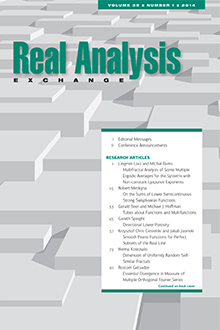Abstract
In the present paper we prove the following theorem: \\ Let \(\{\vf _{m,n}(x,y)\}_{m,n=1}^{\infty} \) be an arbitrary uniformly bounded double orthonormal system on \(I^2:=[0,1]^2\) such that for some increasing sequence of positive integers \(\{N_n\}_{n=1}^\infty \) the Lebesgue functions \(L_{N_n,N_n}(x,y)\) of the system are bounded below a. e. by \( \ln^{1+\epsilon} N_n \), where \(\epsilon \) is a positive constant. Then there exists a function \(g \in L(I^2)\) such that the double Fourier series of \(g\) with respect to the system \(\{\vf _{m,n}(x,y)\}_{m,n=1}^{\infty} \) essentially diverges in measure by squares on \(I^2\). The condition is critical in the logarithmic scale in the class of all such systems %\footnote{ 2000 Mathematics Subject Classification : Primary 42B08; Secondary 40B05. % Key words and phrases: %Essential divergence in measure, orthogonal Fourier series, Lebesgue functions}.
Citation
Rostom Getsadze. "Essential Divergence in Measure of Multiple Orthogonal Fourier Series." Real Anal. Exchange 39 (1) 91 - 100, 2013/2014.
Information





